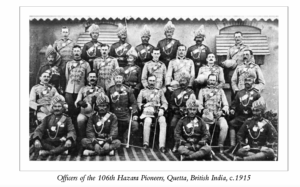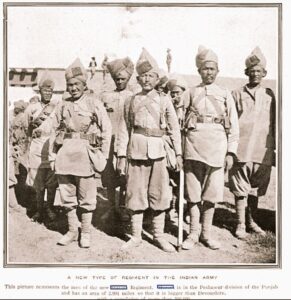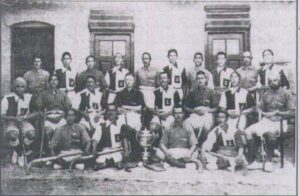By: Ishaq Mohammadi
The Hazara Pioneers, or Lashkar Hazara, hold a unique place in military history. They embody resilience, discipline, and excellence. Formed in 1904 under the British Indian Army, this regiment showcased the remarkable abilities of the Hazara people. This community endured significant historical adversities, including displacement and systemic discrimination in their homeland.
In the late 19th century, the Hazaras of central Afghanistan were a thriving community. That changed in 1892 when Amir Abdur Rahman Khan waged a brutal campaign against them. Stripped of their lands and livelihoods, thousands fled to neighboring countries, including British India. In Shalkot (modern-day Quetta), these displaced Hazaras began rebuilding their lives, finding opportunities to serve in the British Indian Army.

Even before the mass migrations, a small group of Hazaras had joined the 124th and 126th Balochistan Infantry in the early 1830s. Their exceptional soldierly qualities—bravery, discipline, and marksmanship—did not go unnoticed. Lord Kitchener, then Chief of the Indian Army, recognized their potential and directed Major Jacob (later Field Marshal) to form a Hazara regiment. Thus, the 106th Hazara Pioneers was established in 1904, headquartered in Quetta Cantt. Initially comprising personnel transferred from the Balochistan Infantry, the regiment grew to include 914 members.

While their primary role was engineering—constructing roads and railways in the unforgiving terrain of Balochistan—the Hazara Pioneers were much more than builders. They were soldiers and athletes, setting benchmarks in both combat and sports. Their work on the Quetta-Chaman, Quetta-Zhob, and Quetta-Sibi routes was crucial to the region’s development, often completed under harsh conditions.
When the drums of war called, the Hazara Pioneers answered. During World War I, they fought bravely in Iraq and France, earning the admiration of their British superiors. They also defended British India’s borders in Waziristan, and their performance was so exceptional that they became one of the most celebrated regiments in the Indian Army.
A staggering 715 medals for bravery and gallantry were awarded to Hazara Pioneer officers and soldiers—a record unmatched by most regiments of their time. Brigadier Bunbury once remarked, “In rifle shooting, the Hazara Pioneers were the best regiment in the entire Indian Army. Their soldiers were natural marksmen.”
Their prowess wasn’t limited to the battlefield. The regiment dominated All-India competitions, winning prestigious trophies like the King Emperor Cup and Rawlinson Shield. In 1926, they triumphed in the Indian Army Hockey Championship, with two players earning spots on the Indian national team for a tour of New Zealand. Their victories in hill-running competitions, thanks to Rahmatullah Khan’s grueling training routines, further highlighted their unparalleled determination.
General Musa Khan, a Hazara Pioneer private (Sepoy) who later became Pakistan’s Army Chief, often proudly spoke about the regiment. He recalled how the camaraderie, discipline, and rigorous training shaped his career. “Success wasn’t accidental,” he once said. “It was the result of relentless preparation.”
For the men of the Hazara Pioneers, the regiment’s leaders were key in cultivating a culture of excellence. Subedar Majors, including Dost Muhammad Khan, Ali Dost Khan, Khudadad Khan, and Rahmatullah Khan, played crucial roles in guiding and motivating their troops. Intense training routines, like 50-kilometer runs to Hanha Orak (now a dam site near Quetta), equipped them for success in competitions and combat.
In 1933, economic constraints and political pressures led to the disbandment of the Hazara Pioneers. Officially, financial reasons were cited, but the Afghan government’s insistence on halting Hazara recruitment in the Indian Army played a significant role. This act of prejudice was a bitter reminder of the systemic discrimination the Hazaras faced in their homeland.
Even after the disbandment of the Hazara Pioneers in 1933, Hazara players continued to excel as champions in various sports, including hockey, football, shooting, and more, both in United India and later in United Pakistan. Their legacy has endured through the years, navigating the ups and downs of changing times. Their remarkable performance is evident when considering that despite a small population—just a few thousand out of the 400 million in United India—they consistently stood as champions in multiple fields. This continued success is a testament to their dedication and talent. However, the regiment’s end did not signal its legacy’s end. The Hazara Pioneers had already demonstrated that a marginalized community could rise above adversity and excel in every field they pursued.

The disbandment marked the end of an era. Yet, the regiment’s contributions left an indelible mark. Figures like General Musa Khan Hazara, a private (Sepoy) in the Pioneers who rose to become Pakistan’s Army Chief, exemplify the enduring legacy of the Hazara Pioneers.
The Hazara Pioneers were more than a military regiment; they symbolized resilience and excellence. From constructing vital infrastructure to setting benchmarks in combat and sports, they showcased the potential of a community that overcame adversity to achieve greatness. Though their formal existence was short-lived, their legacy continues to inspire generations.
